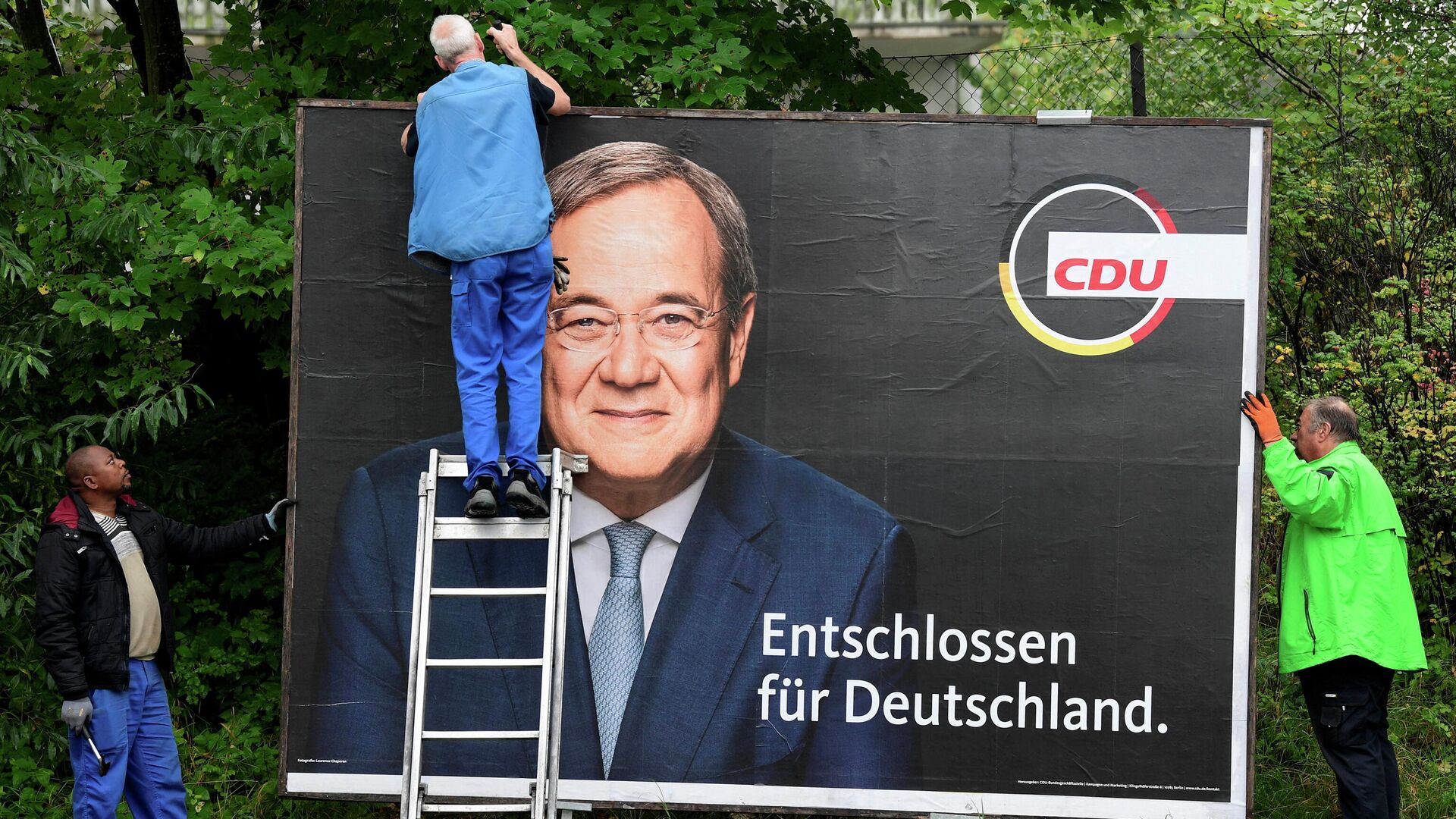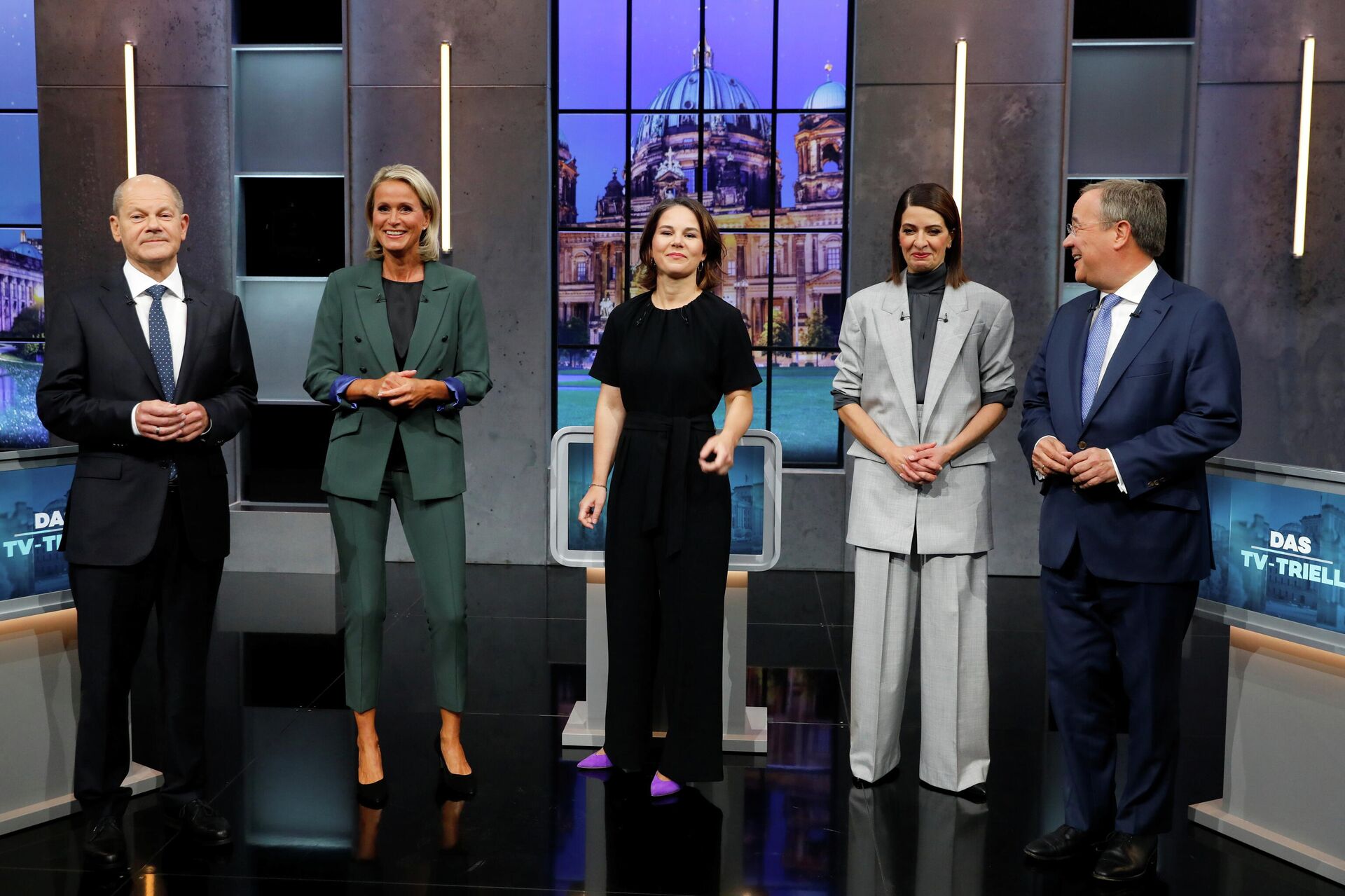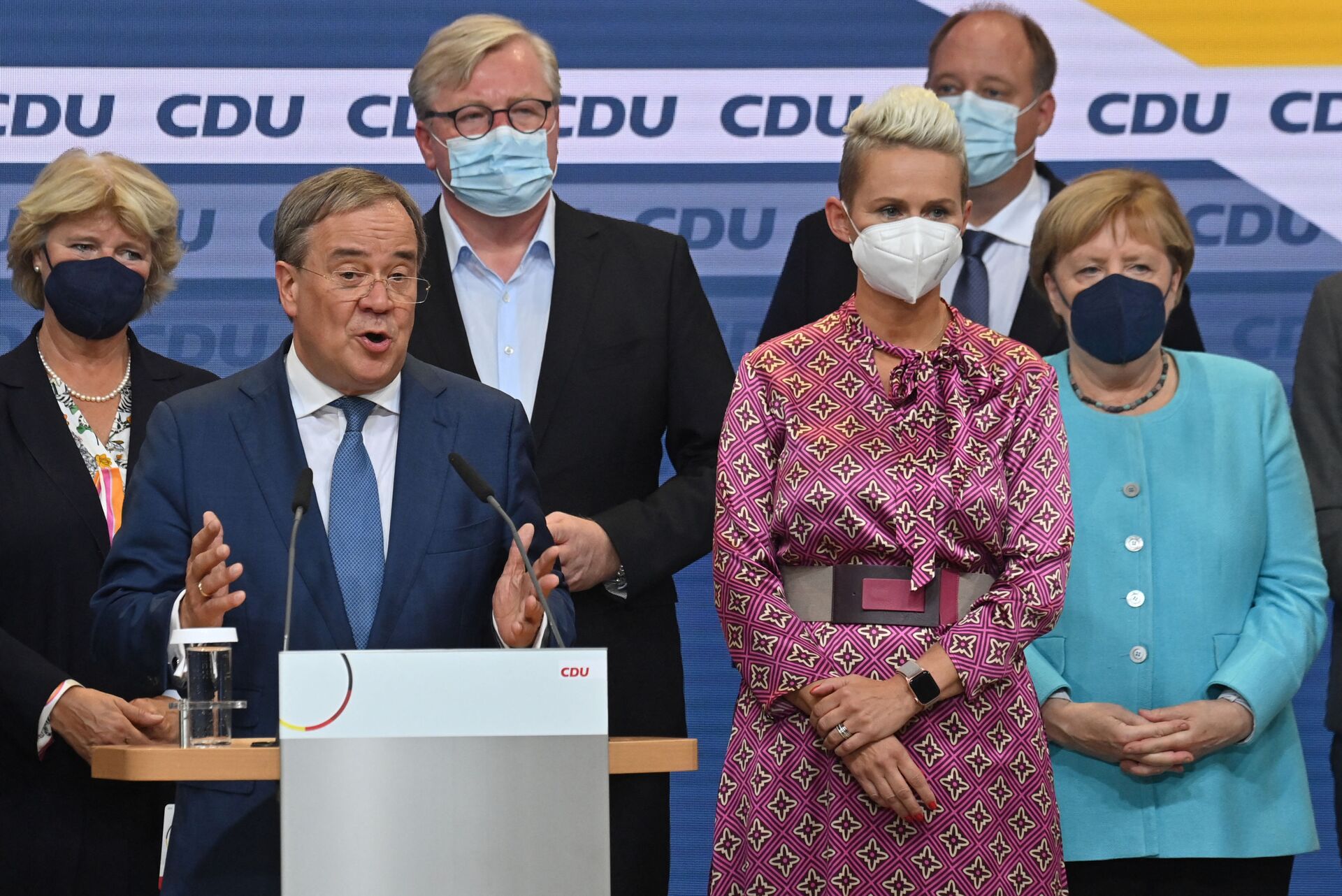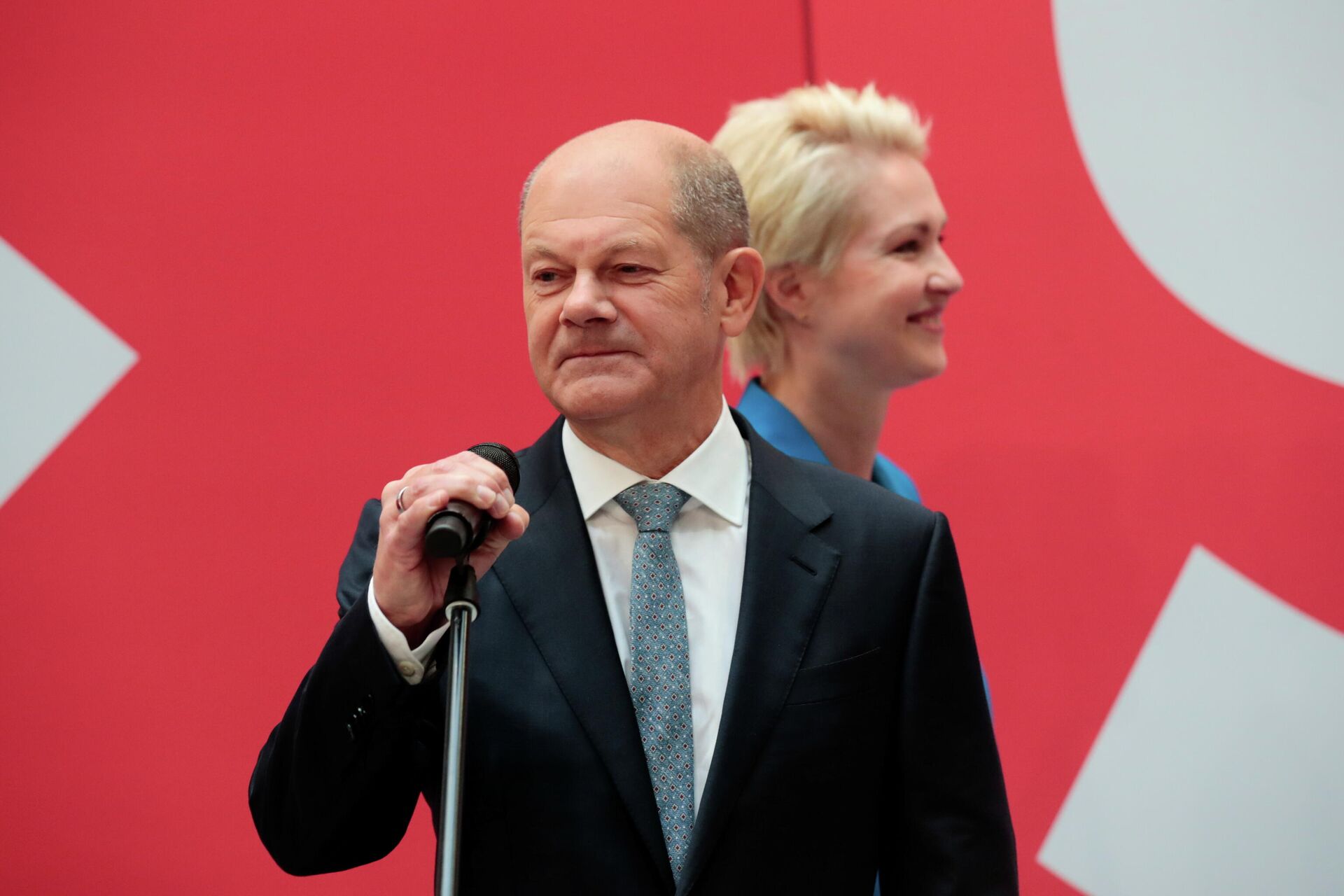https://sputnikglobe.com/20210927/german-elections-does-cdu-have-any-chance-of-forming-coalition-with-greens--free-democrats-1089460401.html
German Elections: Does CDU Have Any Chance of Forming Coalition With Greens & Free Democrats?
German Elections: Does CDU Have Any Chance of Forming Coalition With Greens & Free Democrats?
Sputnik International
Germany's centre-left Social Democrats (SPD) outperformed the centre-right Christian Democratic Union (CDU) 25.7% to 24.1% in Sunday's parliamentary elections... 27.09.2021, Sputnik International
2021-09-27T19:41+0000
2021-09-27T19:41+0000
2024-03-11T10:57+0000
newsfeed
world
opinion
germany
green party of germany
social democratic party of germany (spd)
christian democratic union (cdu)
free democratic party (fdp)
european army
european union (eu)
https://cdn1.img.sputnikglobe.com/img/07e5/09/1b/1089445644_0:83:3072:1811_1920x0_80_0_0_995964036d07ebd728b7f699afd5ce9f.jpg
SPD leader Olaf Scholz, who has been serving as vice-chancellor of Germany and federal minister of finance since 14 March 2018, is racing against the clock to kick off negotiations with the Greens and the Free Democratic Party (FDP) over a new government coalition.Nevertheless, CDU leader Armin Laschet said he would also try to form a three-party alliance with the Greens and Free Democrats in a bid to find a path to power. Previously, Merkel hailed Laschet as a "bridge-builder who will get people on board" at the final CDU rally in Aachen. The CDU leader's unwillingness to concede may potentially lead to a protracted power struggle. As for Merkel, she will stay in power until the coalition is formed. According to some observers, the coalition negotiations may last until Christmas.Two Possible Scenarios for SPD and CDUThere are two scenarios of how things could pan out for the SPD and the CDU, according to Professor Christian Schweiger, chair for Comparative European Governance Systems in the Institute for Political Science at the Chemnitz University of Technology in Germany.In any event, the Liberals and Greens will join the new government, the professor stresses. However, a three-party ruling coalition could make Berlin's political strategy less stable and less predictable, according to the professor.For example, "there's a big gap between the foreign policy approach of the Greens on the one hand and the CDU and the FDP on the other hand" in a potential Jamaica coalition, he explains. Things will not be any easier if Olaf Scholz comes out on top, according to Schweiger: there are serious divisions between the FDP and the SPD. For instance, the SPD is regarded as more "Russia-friendly," while the FDP is more oriented towards the United States, he notes. Meanwhile, the Greens are expected to continue to adhere to their pacifist and anti-war agenda which could, potentially, complicate Berlin's relations with NATO. In January 2021, the German Greens "went nuclear" over the NATO call for Berlin to do more for the transatlantic alliance, according to Politico.Laschet Would Continue Merkel's Approach in Terms of Foreign PolicyIn Schweiger's view, the Jamaica coalition of the CDU, Greens, and the FDP under Laschet would "offer the most stability in terms of foreign policy." The professor recalls that Laschet promised to continue the country's foreign policy and European strategy of his predecessor, Angela Merkel.Meanwhile, it cannot be completely ruled out that Laschet could manage to form a coalition despite a narrow defeat. Schweiger notes that Christian Lindner, the FDP leader, has hinted at the possibility of a Jamaica coalition in one of his recent interviews. At the same time, Robert Habeck, who has served as co-leader of Alliance '90/The Greens since 2018 alongside Annalena Baerbock, "clearly seems to be in favour of a coalition with the CDU," according to the academic.The professor assumes that there "could well be a situation where Habeck and Lindner find common ground and argue very strongly in favour of a Jamaica coalition and win the argument with their own parties."Scholz Would Try to Make EU More Independent, But Likely to Shelve EU Army IdeaWhoever forms the new coalition government, Germany is likely to focus on domestic issues, environmental policies and the effects of the pandemic and is less likely to be engaged in the European Union under a three-party coalition, according to Schweiger.Tim Buthe, professor of International Relations at TUM School of Governance, Technical University of Munich, holds a different view. He cites Scholz, who has recently stated that the main goal of German policy under his government would be to create a strong EU.While a potential Scholz government is likely to focus on making the EU independent from super-powers, the professor doubts that the SPD leader will push for the creation of a European Army – an idea previously considered by Chancellor Merkel. Besides that, the Greens, who are likely to enter the governing coalition, would not be very enthusiastic about it, the professor remarks. A European Army has long been "a mostly symbolic project," according to Buthe."Upgrading that substantially would imply a greater military role for Germany in world affairs," he says. "I don't anticipate that being a priority item on the agenda of the new government."
germany
Sputnik International
feedback@sputniknews.com
+74956456601
MIA „Rosiya Segodnya“
2021
News
en_EN
Sputnik International
feedback@sputniknews.com
+74956456601
MIA „Rosiya Segodnya“
Sputnik International
feedback@sputniknews.com
+74956456601
MIA „Rosiya Segodnya“
newsfeed, opinion, germany, green party of germany, social democratic party of germany (spd), christian democratic union (cdu), free democratic party (fdp), european army, european union (eu), election
newsfeed, opinion, germany, green party of germany, social democratic party of germany (spd), christian democratic union (cdu), free democratic party (fdp), european army, european union (eu), election
German Elections: Does CDU Have Any Chance of Forming Coalition With Greens & Free Democrats?
19:41 GMT 27.09.2021 (Updated: 10:57 GMT 11.03.2024) Germany's centre-left Social Democrats (SPD) outperformed the centre-right Christian Democratic Union (CDU) 25.7% to 24.1% in Sunday's parliamentary elections, according to provisional results. German academics have discussed the potential composition of government coalitions and their agendas.
SPD leader Olaf Scholz, who has been serving as vice-chancellor of Germany and federal minister of finance since 14 March 2018, is racing against the clock to kick off negotiations with the Greens and the Free Democratic Party (FDP) over a new government coalition.
Nevertheless, CDU leader Armin Laschet said he would also try to form a three-party alliance with the Greens and Free Democrats in a bid to find a path to power. Previously, Merkel hailed Laschet as a "bridge-builder who will get people on board" at the final CDU rally in Aachen. The CDU leader's unwillingness to concede
may potentially lead to a protracted power struggle. As for Merkel, she will stay in power until the coalition is formed. According to some observers, the coalition negotiations may last until Christmas.
Two Possible Scenarios for SPD and CDU
There are two scenarios of how things could pan out for the SPD and the CDU, according to Professor Christian Schweiger, chair for Comparative European Governance Systems in the Institute for Political Science at the Chemnitz University of Technology in Germany.
"We could either see Laschet in government as a chancellor under the Jamaica coalition, the CDU/CSU, Greens, and the FDP, or alternatively, the so-called traffic light coalition, which is the SPD, Greens, and the FDP," Schweiger says.
In any event, the Liberals and Greens will join the new government, the professor stresses. However, a three-party ruling coalition could make Berlin's political strategy less stable and less predictable, according to the professor.
For example, "there's a big gap between the foreign policy approach of the Greens on the one hand and the CDU and the FDP on the other hand" in a potential Jamaica coalition, he explains. Things will not be any easier if Olaf Scholz comes out on top, according to Schweiger: there are serious divisions between the FDP and the SPD. For instance, the SPD is regarded as more "Russia-friendly," while the FDP is more oriented towards the United States, he notes.
Meanwhile, the Greens are expected to continue to adhere to their pacifist and anti-war agenda which could, potentially, complicate Berlin's relations with NATO. In January 2021, the German Greens "went nuclear" over the NATO call for Berlin to do more for the transatlantic alliance,
according to Politico.
Laschet Would Continue Merkel's Approach in Terms of Foreign Policy
In Schweiger's view, the Jamaica coalition of the CDU, Greens, and the FDP under Laschet would "offer the most stability in terms of foreign policy." The professor recalls that Laschet promised to continue the country's foreign policy and European strategy of his predecessor, Angela Merkel.
Meanwhile,
it cannot be completely ruled out that Laschet could manage to form a coalition despite a narrow defeat. Schweiger notes that Christian Lindner, the FDP leader, has hinted at the possibility of a Jamaica coalition in one of his recent interviews. At the same time, Robert Habeck, who has served as co-leader of Alliance '90/The Greens since 2018 alongside Annalena Baerbock, "clearly seems to be in favour of a coalition with the CDU," according to the academic.
"Of course there is a certain priority for talks with the SPD and the FDP," Habeck told journalists following the race. "But this doesn’t mean we won’t speak with [the CDU]."
The professor assumes that there "could well be a situation where Habeck and Lindner find common ground and argue very strongly in favour of a Jamaica coalition and win the argument with their own parties."
Scholz Would Try to Make EU More Independent, But Likely to Shelve EU Army Idea
Whoever forms the new coalition government, Germany is likely to focus on domestic issues, environmental policies and the effects of the pandemic and is less likely to be engaged in the European Union under a three-party coalition, according to Schweiger.
Tim Buthe, professor of International Relations at TUM School of Governance, Technical University of Munich, holds a different view. He cites Scholz, who has recently stated that the main goal of German policy under his government
would be to create a strong EU.
"I think above all, what [Scholz] is implying here is: an EU that remains cohesive and that achieves common policy goals now, in light of the British exit from the EU, in light of questions being raised about the value of EU membership in some of the other European countries, but also in light of the questions raised about EU membership by this nationalist right-wing party, AFD, which lost a little bit in the in the election, but remains a notable force that will have representation in the next parliament, about 10 percent of the seats," Buthe suggests.
While a potential Scholz government is likely to focus on making the EU independent from super-powers, the professor doubts that the SPD leader will push for the creation of a European Army – an idea previously considered by Chancellor Merkel. Besides that, the Greens, who are likely to enter the governing coalition, would not be very enthusiastic about it, the professor remarks. A European Army has long been "a mostly symbolic project," according to Buthe.
"Upgrading that substantially would imply a greater military role for Germany in world affairs," he says. "I don't anticipate that being a priority item on the agenda of the new government."







